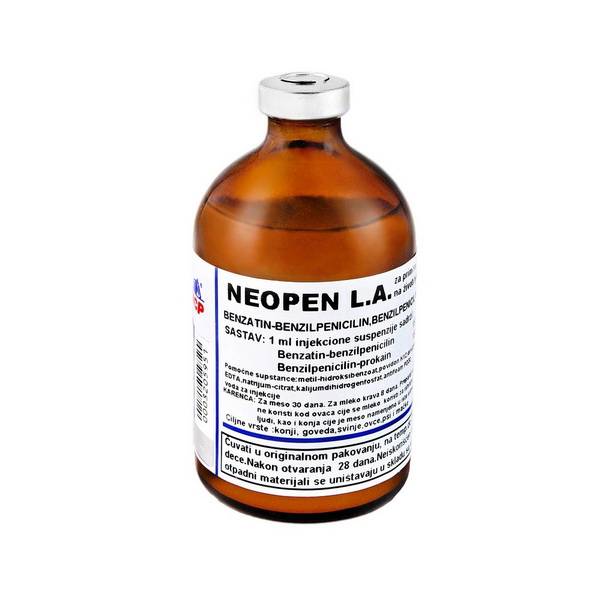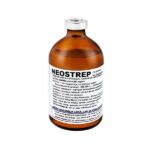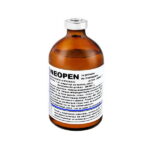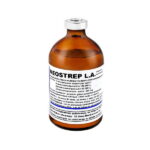Description
Neopen L.A.
Composition: 1 ml suspension for injection contains:
Procaine-benzylpenicillin 150.000 i.u
Benzathine-benzylpenicillin 150.000 i.u
Indications: Infections of the respiratory tract (brohnitis, tonsillitis, pharyngitis),
abscesses, phlegmon, inflammatory processes, anthrax and other diseases caused by
bacteria sensitive to penicillin.
Contraindications: Hypersensitivity and allergy to penicillins and cephalosporins. Do
not give the drug to pregnant sows and gilts (due to possible abortion), race horses 2
weeks before the race and small herbivores (guinea pig, rabbit, hamster and gerbil).
Side effects: Can lead to hypersensitivity reactions: nerve disorders (ataxia,
incoordination movement), transient fever and / or vomiting. Sometimes in pregnant
sows and gilts vaginal discharge may appear.On application site the drug causes local
stimulatory effect that is manifested with irritation and swelling. Local use of penicillin on
the skin of some dogs can cause hypersensitivity and to those who were previously
treated with systemic penicillin. Besides skin (allergic dermatitis) and pharynx (swelling
and inflammation), local allergic reaction is most pronounced in eyes.Combination of
benzylpenicillin-procaine with benzylpenicillin-potassium rapidly applied i.v. cause
cardiac arrest, and the benzylpenicillin-procaine applied at high doses causes excitation
of the central nervous system that is associated incoordination movements, ataxia, and
general restlessness animals, especially horses.Penicillin can cause diarrhea,
hemorrhagic colitis respective fatal especially in guinea pigs, and rabbits, hamsters,
horses and people.At horses benzylpenicillin-procaine or procaine from penicillin causes
the depressive effects on the heart.
Target species: horses, cattle, pigs, sheep, dogs and cats.
Dosage and method of administration: The drug is given once, deeply
intramuscularly. If necessary, drug administration may be repeated after 3 to 4 days. The
daily dose of all the animals at 1 ml to 10-20 kg body weight,depending on the intensity
of the disease, with repeat after 3-4 days. The dose for pigs is 1 ml to 5 kg body weight.
Instructions for proper use of medicine: Do not give i.v. medication intratraheal. do
not give more than 15-20 mL of the drug to cattle and the horses at one injection site,
calves, horses, pigs and sheep, no more than 10 mL for small animal (dog and cat) up to
5 mL drug per injection site.
Withdrawal period: Meat of treated animals is not for human consumption during
treatment and 30 days after the last drug administration. Milk of treated cows is not for
human consumption during and 8 days after the last treatment.Medicine is not given to
the sheep whose milk is used to feed people as well as horses whose meat is intended
for the same purpose.
Special considerations:
For use in animals:
Penicillin salts are not very toxic and well tolerated by the animals provided with multiple
therapeutic doses. In the case of extremely high doses it may cause sensitization and
allergic reactions.If drug allergy appears in the animals that come into contact with the
drug, adrenaline is used, and then if necessary, antihistamines and glucocorticoids.
In sows and gilts as a result of giving this drug there may occur vaginal washing and
abortus.Acute allergic reactions to penicillin were found in dogs and cattle.Local allergies
were noticed in the eye and pharynx of the dogs and allergic dermatitis is registered too
.Allergic reactions occur in horses after administration of high doses of drug. At horses,
penicillin given in high doses can cause CNS excitation that is accompanied with
incoordination movements, ataxia, and general restlessness animals.
Penicillin in solution precipitates or inactivates aminophylline, ascorbic acid,
phenothiazine, cephalothin, sodium hydrogen carbonate and vitamin B complex.Penicilin
is gradually inactivated in solution for infusion. Acids, bases and oxidants rapidly
inactivate penicillin. The product is incompatible with anticoagulants, miorelaxant, acids,
bases and oxidants means.
Use in pregnancy and lactation:
Do not give in lactating dairy animals whose milk is used in the human diet, the dry
period and pregnant cows 2 months before parturition.
Special considerations for persons administering the veterinary medicinal product
to animals:
People sensitive to penicillins, cephalosporins, streptomycin and other aminoglycoside
antibiotics should avoid contact with drug .Before use, mix well.If the allergic reactions
occur while using the drug in people who come into contact with the drug, use
epinephrine, if necessary, antihistamines and glucocorticoids.
Special precautions for disposal and destruction of drug
Unused drug or drug residues shall be destroyed in accordance with applicable
regulations.
Special considerations for storing drugs:
The drug kept in the original packaging, at temperatures up to 25˚C.
Keep out of the reach of children.
Shelf life in original packaging: 2 years.
Shelf life after opening: 28 days
Method of issue: on prescription of veterinarian.
ATCvet code: QJ01CE30
Packing: bottle of dark glass type II of 100 mL and 50 mL, closed with bromobutyl
rubber stopper and aluminum cap
Number and date of registration:
1x 50 mL 23/2011/1400 date 10.01.2011
1×100 mL 24/2011/1400 date 10.01.2011
Producer: “FM Pharm”, Subotica, 024/548-130




Reviews
There are no reviews yet.